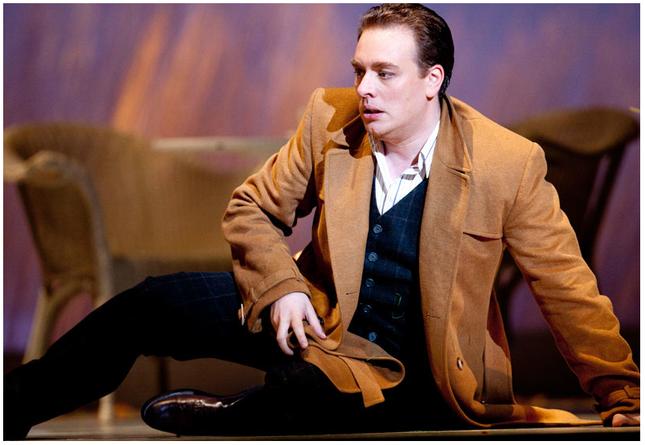The Sorrows and the Triumphs of ‘Werther’
By • June 8, 2012 0 1331

If you should happen to have the opportunity to see the Washington National Opera production of Jules Massenet’s “Werther”–and you should, you should–check out your audience compatriots.
On opening night, the mish mash of reactions was almost worth the show itself: a young woman was complaining that all he ever says is “I love you, I love you, I mean give it a rest,” while another woman sitting a few seats down from us wiped tears from her eyes. Later, you could hear cheers and whistles after one of Italian tenor Francesco Meli’s soaring musical expression’s of, yes, “I love you.” At the end, there were more tears, but also bubbles of giggles here and there when Meli’s Werther recouped several times before finally succumbing to death, wearing a white shirt bloodier than that of a mob victim’s shotgun blast.
With “Werther,” some audience members in 2012 might find themselves at sea. The opera is an interior epic about the impossibility of fulfilling perfect love, especially after you’ve found it. But this production–and the opera, itself–is worth opening your mind and heart to precisely because of all of its improbabilities, its strangeness, and yes, even occasional silliness. For myself, I’d like to say “Ich Bin Ein Werther” fan, even if it is sung in French.
“It’s so over the top,” someone complained to me. For some reason, this reminded me of Alan Rickman as the Sheriff of Nottingham in a Robin Hood movie, starring (improbably) Kevin Costner ordering a henchman to tear out someone’s liver with a wooden spoon. “That’s going to hurt,” the henchman said. “It’s supposed to hurt,” the sheriff yells. To which I might add, this is a real opera about a guy suffering from terminal heartbreak: it’s supposed to be over the top.
The source of “Werther” is a ground-breaking, influential novel, “The Sorrows of Young Werther”, by Johann Wolfgang von Goethe, the 18th-century uber-philosopher of endless, high-minded love. Goethe is one of those Germanic writers whose genius is so great that it’s beyond reproach. The novel depicts a young, gifted poet who falls completely, totally and painfully in love with a woman named Charlotte, already spoken for and taken. He persists and persists in proclaiming his love–idyllic, complete and perfect–and eventually kills himself. Historically, this novel by a 25-year-old Goethe not only inflamed romanticism among its impressionable readers, but reportedly sparked a number of art-imitating-death suicides among some readers.
The opera follows Goethe’s story as Werther visits an idyllic small town full of happy families and children. Here, after soaringly waxing about the beauty of this natural setting, he meets the much-beloved Charlotte. It is the perfect match of souls except that she’s engaged to be married to the somewhat stuffy and momentarily businessman Albert. The would-be-but-cannot-be lovers straddle the thin line between anguish and agony all of the time. You can almost agree with what a 19th-century critic of the opera said: in the first act, the hero despairs, continues to despair in the second act and third acts and becomes desperate in the final act.
So, why should we care about Werther and his extreme and total embrace of doomed romanticism? Here’s a few very good reasons, to my mind: the expression–musically–of the passion, buoyed by powerful storms of brass, by swells of heavy strings, and the singing and performing of a fine cast. While Meri has to carry the opera, Massenet’s music is so gorgeous that it rides right over the things that might otherwise drive you crazy about it. And mezzo-soprano Sonia Ganassi, with her supporting singing as well as her acting, makes us believe in Charlotte’s qualities, a life-affirming charm that enchants the children’s she’s helped raise for her father, which makes her utterly appealing not only to Werther but to everyone. “How can one not love Charlotte?” Werther sings helplessly.
Charlotte is an ideal, and that’s what Werther is most in love with–idylls and ideals. Werther leaves town and re-appears once, after Charlotte has married the increasingly frustrated Albert, who at one point helpfully lets a servant carry a set of pistols to Werther.
“Werther” is set in a sunny, energetic place where bon vivants drink happily outside the town church, observing the goings on of weddings, anniversaries, children and so forth. It’s a setting Werther finds idyllic, but also, with his stormy expressions of love, is outside of.
The production, directed by Chris Alexander and conducted by Emmanuel Villaume, is updated to the 1920s, which gives it a quality closer to us. The music is a weather vane, and it functions beautifully on its own. In a showcase scene, Charlotte, increasingly worried about Werther, tries to leave a formal dinner at her home, but guests keep arriving with fanfare in a tense, heightened scene with no singing and no words.
Poor Werther. Fascinating Werther. Great “Werther.”
- “Werther” will be performed at the Kennedy Center’s Opera House through May 27. | Scott Suchman for WNO
- Scott Suchman for WNO



